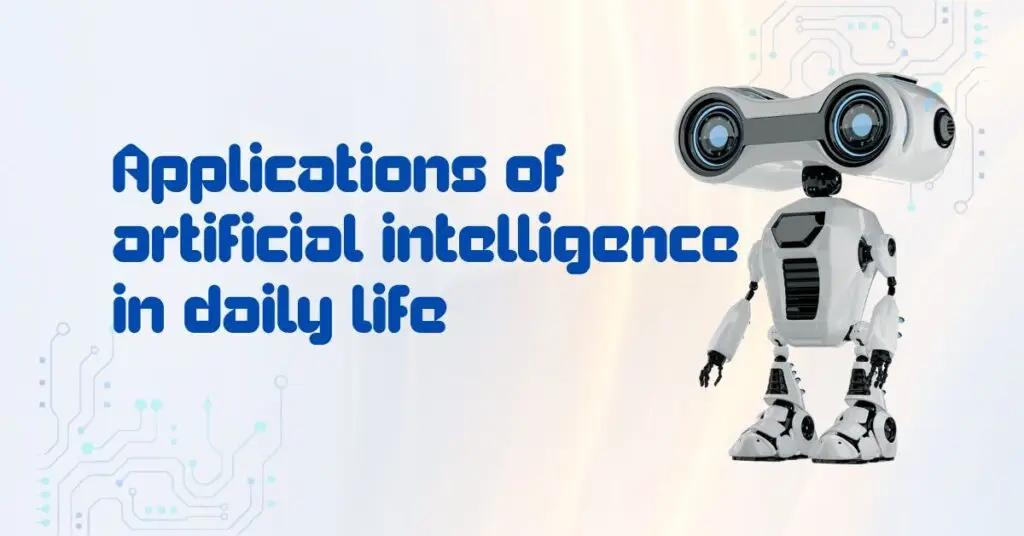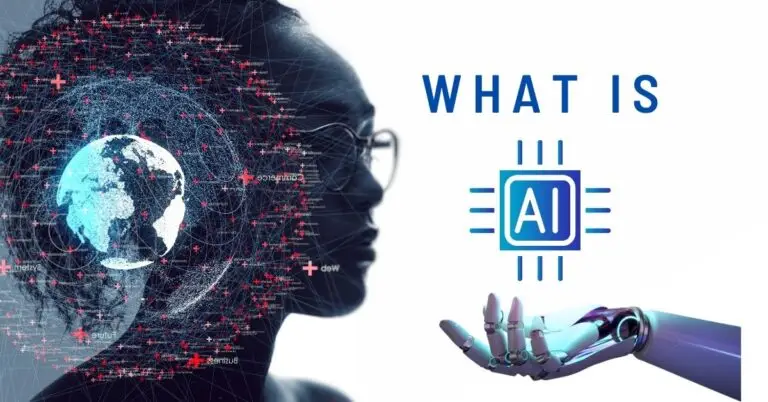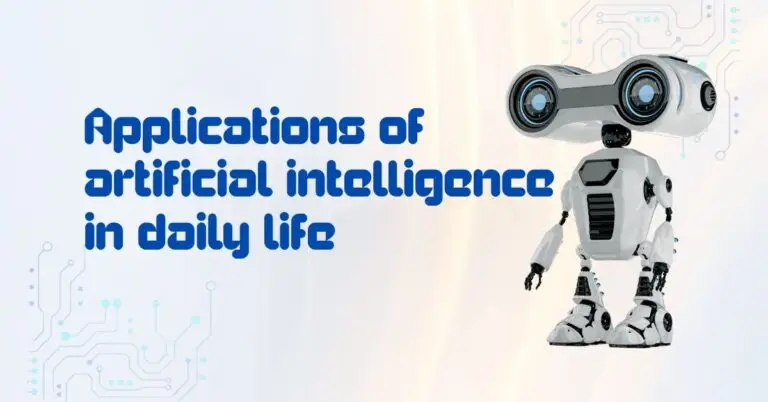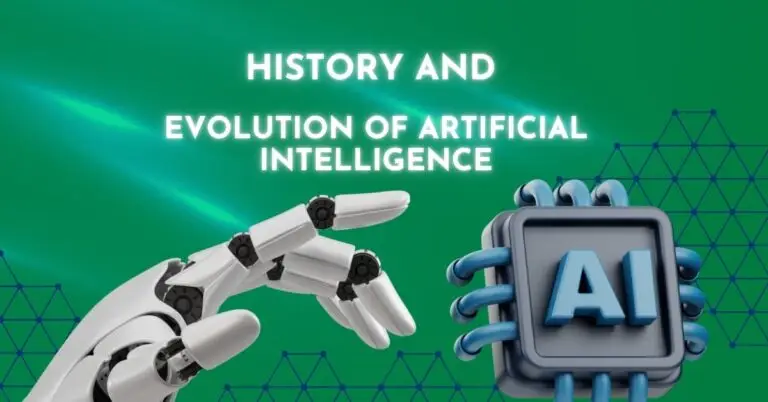Applications of artificial intelligence in daily life: Learn how AI improves everyday activities, from smart home devices and voice assistants to personalized recommendations and healthcare innovations. Learn how AI is seamlessly integrated into our routines, making life more efficient and connected.
Artificial Intelligence (AI) is no longer a futuristic concept; it’s a part of our daily lives. From the moment we wake up to the time we go to bed, AI is there, making our lives easier and more efficient.
Whether it’s through personal assistants like Siri and Alexa, or the recommendation algorithms on Netflix and Spotify, AI is seamlessly integrated into our routines. This blog post explores the various applications of AI in daily life, highlighting how this technology is transforming the way we live, work, and play.
AI in Personal Assistants
Artificial Intelligence (AI) has revolutionized personal assistants, making them an integral part of our daily lives. Voice assistants like Siri, Alexa, and Google Assistant use natural language processing (NLP) to understand and respond to voice commands.
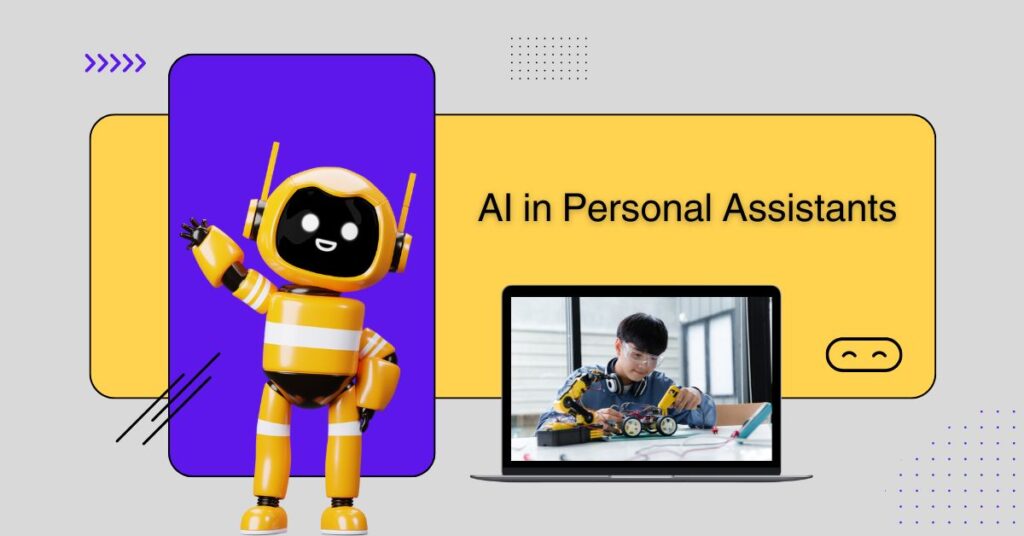
These AI-driven tools help with tasks such as setting reminders, answering queries, and controlling smart home devices, enhancing convenience and efficiency.
Voice Assistants
Voice assistants are designed to perform a variety of tasks through voice commands. They can:
- Set Reminders and Alarms: Helping users manage their schedules.
- Answer Questions: Providing information on a wide range of topics.
- Control Smart Home Devices: Managing lights, thermostats, and security systems.
Chatbots
Chatbots are another form of AI personal assistants, commonly used in customer service. They:
- Provide Instant Support: Answering customer queries in real-time.
- Automate Routine Tasks: Handling tasks like booking appointments and processing orders.
- improve User Experience: Offering personalized interactions based on user data.
By integrating AI personal assistants into our daily routines, we can streamline tasks, save time, and improve overall productivity. These tools are continually evolving, becoming more intuitive and capable, further embedding AI into our everyday lives.
AI in Entertainment
Artificial Intelligence (AI) is transforming the entertainment industry, making experiences more personalized and engaging. From streaming services to gaming, AI is enhancing how we consume and interact with content.
Streaming Services
AI algorithms analyze user preferences and viewing habits to provide personalized recommendations on platforms like Netflix and Spotify. This not only improves user satisfaction but also helps discover new content tailored to individual tastes.
Gaming
In the gaming world, AI is used to create more realistic and challenging experiences. AI-driven Non-Player Characters (NPCs) adapt to player actions, providing a dynamic and immersive gameplay experience. Additionally, AI helps in developing adaptive difficulty levels, ensuring that games remain engaging for players of all skill levels.
By integrating AI into entertainment, companies can offer more tailored and enjoyable experiences, keeping users engaged and satisfied.
As AI technology continues to evolve, its impact on the entertainment industry will only grow, offering even more innovative and personalized experiences.
AI in Healthcare
Artificial Intelligence (AI) is revolutionizing the healthcare industry, enhancing diagnostics, personalizing treatments, and improving patient care.

By leveraging AI, healthcare providers can offer more accurate, efficient, and personalized services.
Diagnostics
AI-powered tools are transforming medical diagnostics. For example, AI algorithms can analyze medical images to detect conditions like tumors and fractures with high accuracy. This not only speeds up diagnosis but also reduces the likelihood of human error.
Personalized Medicine
AI enables personalized medicine by analyzing a patient’s genetic information and medical history to tailor treatments. This approach ensures that patients receive the most effective therapies based on their unique profiles, improving outcomes and reducing side effects.
Virtual Health Assistants
Virtual health assistants, powered by AI, help monitor patient health and provide medical advice. These assistants can track vital signs, remind patients to take medications, and even offer preliminary diagnoses based on symptoms, making healthcare more accessible and proactive.
AI in Transportation
Artificial Intelligence (AI) is revolutionizing the transportation sector, enhancing safety, efficiency, and convenience. From autonomous vehicles to smart traffic management, AI is transforming how we move.
Autonomous Vehicles
Self-driving cars, powered by AI, use machine learning, computer vision, and sensor fusion to navigate roads, recognize obstacles, and make real-time decisions. Companies like Tesla and Waymo are leading the development of these vehicles, which aim to reduce accidents caused by human error, decrease traffic congestion, and improve fuel efficiency.
Traffic Management
AI algorithms analyze real-time traffic data from sensors, cameras, and GPS devices to predict traffic patterns and optimize traffic flow. This helps reduce travel time, fuel consumption, and emissions. Cities like Los Angeles and Singapore are already using AI-based traffic management systems to enhance urban mobility.
Predictive Maintenance
AI monitors vehicle health through sensors and onboard diagnostics. By analyzing data, AI can predict when maintenance is needed, preventing breakdowns and reducing downtime. This is particularly useful for public transportation fleets and logistics companies, improving safety and operational efficiency.
Ride-Hailing Services
AI enhances ride-hailing services like Uber and Lyft by efficiently matching drivers with passengers, optimizing routes, and predicting demand. This leads to shorter wait times, reduced travel costs, and a better overall user experience.
By integrating AI into transportation, we can create safer, more efficient, and environmentally friendly systems. As AI technology continues to advance, its impact on transportation will grow, offering innovative solutions to modern mobility challenges.
AI in Home Automation
Artificial Intelligence (AI) is making our homes smarter, more efficient, and more secure. By integrating AI into home automation, we can control various aspects of our living spaces with ease and precision.
Smart Home Devices
AI-powered smart home devices, such as thermostats, security systems, and lighting, learn from user behavior to optimize settings. For example, smart thermostats adjust the temperature based on your daily routine, saving energy and reducing costs.
Voice Control
Voice-controlled assistants like Amazon Alexa and Google Assistant allow users to manage their home devices hands-free. You can adjust lighting, set alarms, and control appliances simply by speaking, making home management more convenient and accessible.
Predictive Maintenance
AI can predict when home appliances need maintenance by analyzing usage patterns and performance data. This proactive approach helps prevent breakdowns and extends the lifespan of your devices, ensuring they operate efficiently.
Enhanced Security
AI enhances home security through advanced surveillance systems that can detect unusual activity and send real-time alerts. Smart locks and cameras use facial recognition to identify familiar faces and alert you to potential intruders, providing peace of mind.
Energy Management
AI helps manage energy consumption by analyzing usage patterns and making adjustments to reduce waste. Smart lighting and appliances can automatically turn off when not in use, leading to significant energy savings and a more eco-friendly home.
By incorporating AI into home automation, we can create living spaces that are not only more comfortable and convenient but also more efficient and secure. As AI technology continues to evolve, the capabilities of smart homes will expand, offering even greater benefits to homeowners.
AI in Finance
Artificial Intelligence (AI) is transforming the finance industry by enhancing security, improving customer service, and optimizing financial management. By leveraging AI, financial institutions can offer more efficient, accurate, and personalized services.
Fraud Detection
AI algorithms analyze transaction patterns to detect unusual activities and potential fraud in real time. This proactive approach helps prevent financial crimes and protects customers’ assets. Banks and financial institutions use AI to monitor transactions and flag suspicious behavior, reducing the risk of fraud.
Personal Finance Management
AI-powered apps and tools help individuals manage their finances more effectively. These tools can:
- Track Spending: Categorize expenses and provide insights into spending habits.
- Budgeting: Create personalized budgets based on income and spending patterns.
- Investment Advice: Offer tailored investment recommendations using robo-advisors, which analyze market trends and individual risk profiles.
Customer Service
AI chatbots and virtual assistants enhance customer service by providing instant support and handling routine inquiries. These AI-driven tools can:
- Answer Common Questions: Provide information on account balances, transaction history, and more.
- Assist with Transactions: Help users transfer funds, pay bills, and manage accounts.
- Offer Financial Advice: Provide personalized financial tips and guidance based on user data.
Algorithmic Trading
AI is revolutionizing trading by analyzing vast amounts of data to identify market trends and make trading decisions. Algorithmic trading systems use AI to execute trades at optimal times, maximizing profits and minimizing risks. These systems can process information faster and more accurately than human traders, leading to more efficient markets.
By integrating AI into finance, institutions can enhance security, improve customer service, and optimize financial management. As AI technology continues to advance, its impact on the finance industry will grow, offering innovative solutions to complex financial challenges.
AI in Education
Artificial Intelligence (AI) is transforming education by personalizing learning experiences, automating administrative tasks, and enhancing educational tools. By integrating AI, educators can provide more effective and engaging learning environments.
Personalized Learning
AI-powered platforms adapt to individual student needs by analyzing their learning styles and progress. These platforms offer personalized content, exercises, and feedback, helping students learn at their own pace and improving overall educational outcomes.
Administrative Tasks
AI automates routine administrative tasks such as grading, scheduling, and attendance tracking. This allows educators to focus more on teaching and less on paperwork. AI tools can quickly grade assignments and exams, providing instant feedback to students and saving time for teachers.
Tutoring and Support
AI-driven tutoring systems offer additional support to students outside the classroom. These systems can provide explanations, answer questions, and offer practice problems tailored to each student’s needs. Virtual tutors are available 24/7, making learning more accessible.
Content Creation
AI assists in creating educational content by generating quizzes, tests, and learning materials. It can also help in developing interactive and multimedia-rich content that engages students and enhances their learning experience.
Language Translation
AI-powered translation tools break down language barriers in education. These tools can translate educational materials and facilitate communication between students and teachers who speak different languages, promoting inclusivity and diversity in the classroom.
By integrating AI into education, we can create more personalized, efficient, and inclusive learning environments. As AI technology continues to advance, its role in education will expand, offering innovative solutions to enhance teaching and learning experiences.
AI in Retail
Artificial Intelligence (AI) is revolutionizing the retail industry by enhancing customer experiences, optimizing inventory management, and personalizing marketing strategies. By leveraging AI, retailers can offer more efficient, accurate, and engaging services.
Personalized Shopping Experiences
AI algorithms analyze customer data to provide personalized product recommendations. Platforms like Amazon and Netflix use AI to suggest items based on browsing history and preferences, enhancing customer satisfaction and increasing sales.
Inventory Management
AI helps retailers manage inventory more effectively by predicting demand and optimizing stock levels. Machine learning models analyze sales data, seasonal trends, and other factors to forecast inventory needs, reducing overstock and stockouts.
Customer Service
AI-powered chatbots and virtual assistants provide instant support to customers, answering queries and resolving issues in real time. These tools enhance customer service by being available 24/7, reducing wait times, and improving overall customer satisfaction.
Dynamic Pricing
AI enables dynamic pricing strategies by analyzing market conditions, competitor prices, and customer behavior. Retailers can adjust prices in real-time to maximize profits and stay competitive, ensuring they offer the best prices to attract customers.
Fraud Detection
AI systems monitor transactions for unusual patterns that may indicate fraudulent activity. By analyzing vast amounts of data, AI can detect and prevent fraud more effectively than traditional methods, protecting both retailers and customers.
By integrating AI into retail, businesses can create more personalized, efficient, and secure shopping experiences. As AI technology continues to evolve, its impact on the retail industry will grow, offering innovative solutions to meet the demands of modern consumers.
AI in Communication
Artificial Intelligence (AI) is transforming the way we communicate by enhancing language translation, improving email filtering, and enabling more efficient customer interactions. By leveraging AI, we can achieve clearer, faster, and more personalized communication.
Language Translation
AI-powered translation tools like Google Translate and DeepL break down language barriers by providing real-time translations. These tools use advanced machine learning algorithms to understand context and nuances, making translations more accurate and natural. This facilitates smoother communication in multilingual settings, whether for personal use or in global business environments.
Email Filtering
AI enhances email management by filtering out spam and prioritizing important messages. AI algorithms analyze email content and sender behavior to identify and block spam, phishing attempts, and other unwanted emails. This ensures that users can focus on important communications without being overwhelmed by irrelevant messages.
Customer Support
AI-driven chatbots and virtual assistants improve customer support by providing instant responses to common queries. These tools can handle a wide range of tasks, from answering FAQs to processing orders, freeing up human agents to tackle more complex issues. This leads to faster response times and higher customer satisfaction.
Voice Recognition
AI-powered voice recognition systems, such as those used in virtual assistants like Siri and Alexa, enable hands-free communication. These systems can transcribe spoken words into text, making it easier to send messages, take notes, and perform other tasks without typing. This technology is particularly beneficial for individuals with disabilities and those who need to multitask.
By integrating AI into communication, we can achieve more efficient, accurate, and personalized interactions. As AI technology continues to advance, its impact on communication will grow, offering innovative solutions to enhance how we connect with others.
FAQ: Applications of Artificial Intelligence in Daily Life
- How do AI personal assistants work?
- AI personal assistants like Siri and Alexa use natural language processing to understand and respond to voice commands, helping with tasks like setting reminders, answering queries, and controlling smart home devices.
- How does AI improve healthcare?
- AI enhances healthcare by aiding in diagnostics through medical imaging, personalizing treatment plans based on genetic profiles, and providing virtual health assistants for monitoring patient health.
- What role does AI play in transportation?
- AI optimizes navigation systems with real-time traffic updates, powers autonomous vehicles for safer driving, and improves ride-hailing services by efficiently matching drivers with passengers.
- How is AI used in entertainment?
- AI personalizes recommendations on streaming services like Netflix and Spotify and enhances gaming experiences with intelligent NPCs and adaptive difficulty levels.
- How does AI benefit home automation?
- AI enables smart home devices like thermostats and security systems to learn user preferences, optimize energy usage, and automate routine tasks, making homes more efficient and secure.

